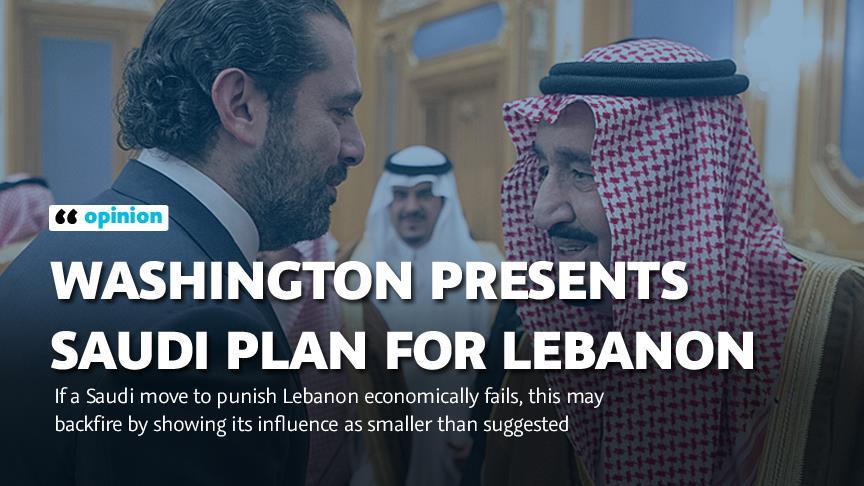OPINION - Washington presents Saudi plan for Lebanon
If a Saudi move to punish Lebanon economically fails, this may backfire by showing its influence as smaller than suggested


WASHINGTON
Saudi Arabia is not known for articulating its policies. One could make little of Riyadh’s position on Lebanon, whose Prime Minister Saad Hariri was summoned to Riyadh to announce his resignation and give a meaningless interview, before moving to what seems to be his exile in Paris.
But where Saudi Arabia says little, its supporters in Washington say a lot. Elliot Abrams, one of the smart veteran American foreign policy operators and commentators, last week in The Weekly Standard
Under the title “Riyadh Realpolitik: The Saudis shake up Lebanon,” Abrams wrote that Saudi Arabia might have finally come to the same conclusion the Israelis have come
Like there is no point in Israel differentiating between Hezbollah and non-Hezbollah targets in any future war with Hezbollah, there is no point in Saudi Arabia differentiating between Hezbollah and non-Hezbollah Lebanese. After all, the state and army of Lebanon are complicit with
Abrams is one of Washington’s honest and principled pundits. He helped engineer former President George W. Bush’s policy of spreading democracy in the Middle East. When push came to shove and Washington’s ally Hosni Mubarak found himself facing a popular revolt in Egypt, Abrams supported the revolt out of his support toward democracy, even if that democracy allowed Islamist parties to surface.
When Abrams’ friends supported Defense Minister Abdul-Fattah
Abrams did not go with the flow when many of his friends supported Donald Trump for president. He signed petitions arguing his take. Because of his principled position against Trump, the U.S. president personally vetoed the appointment of Abrams to become undersecretary of state.
Yet when it came to Lebanon, Abrams seems to have dropped his independent position and endorsed the common “talking points” that are being circulated by the friends of Saudi Arabia and Israel in Washington.
Abrams opens his analysis with a “bit of history.” He says that Hezbollah took over Lebanon in what amounted to a military coup in 2008. Because the Lebanese state has become a mere facade of the pro-Iran militia, it is only normal that those who want to kill Hezbollah end up killing the whole country.
Abrams hopes that ramping up pressure on the Lebanese might push them to trounce Hezbollah. Economic sanctions have never toppled any regime throughout history -- from Saddam Hussein’s Iraq to Iran and North Korea; arguing that Hezbollah forcefully usurped power in Lebanon, then suggesting that the Lebanese should be punished so they might revolt against the group, is contradictory.
If Hezbollah took Lebanon by force, then only force can dislodge the party. And if the Lebanese are forced to live under Hezbollah rule, then why punish them with the party?
Abrams suggests that the Saudis use their leverage to punish all of Lebanon, to punish Hezbollah. “The Saudi deposit of $860 million in the Lebanese Central Bank, meant to stabilize Lebanon’s currency, might be withdrawn,” Abrams writes.
At face value, the Saudi deposit looks sizeable and able to destabilize the Lebanese monetary system. But the governor of Lebanon’s Central Bank, Riyadh Salameh, told Reuters in an interview that the bank’s foreign currency reserves stand at $44 billion, which means that the Saudi withdrawal of $850 million cannot affect the stability of the Lebanese lira.
Abrams adds: “Remittances from Lebanese working outside the country are critical for the country’s economy, constituting about 15 percent of Lebanon’s GDP, and Lebanese working in Saudi Arabia and its Gulf allies provide a significant portion of that.” According to Abrams, “those workers could start to be sent home.”
Of the $7.5 billion in remittances that the Lebanese send back home, some $2.2 billion
Qatar and Kuwait, two Gulf nations that host a considerable number of Lebanese workers, as well as Oman, will probably not deport their Lebanese.
While Saudi and the UAE deporting their Lebanese expats will end up hurting thousands of families, such a step will subtract a maximum of three percent from the GDP, a loss that is not enough to dictate policies in Beirut.
Abrams also writes that 80 percent of “foreign direct investment in Lebanon comes from the Gulf, and it could decline precipitously.”
Again, not all the Gulf will fall in line behind Riyadh if it instructs its citizens to divest from Lebanon, and whatever the Saudi percentage of divestment, its effects may be mitigated by the fact that Saudi money is tied mainly in real estate. Withdrawing it may depress real estate prices, but is not a sure way of shaking the economy.
Finally, Abrams argues that “Saudi tourists to Lebanon increased by 86.77 percent in the first seven months of 2017 compared to the same period last year.” Should “the Saudis and other Gulf nations [tell] their citizens to leave Lebanon. This will hit the tourism industry hard,” Abrams writes. But not really.
The increase in the number of Saudi tourists that Abrams quotes
Of those, only 3.5 percent were
Perhaps to inflate the Saudi role, and to make the case for the Saudis to punish all of Lebanon, Abrams assembles a set of numbers that look threatening, but are in fact small when put in context. This means that if Saudi Arabia and the UAE decide to punish Lebanon, their effect may not prove as big as imagined.
If Saudi Arabia decides to punish Lebanon economically and fails, its step may backfire by showing that the kingdom’s influence is much smaller than suggested. If Riyadh punishes Lebanon without success, it may expose itself as an “emperor without clothes.”
*Opinions expressed in this article are the author’s own and do not necessarily reflect the editorial policy of Anadolu Agency.
Anadolu Agency website contains only a portion of the news stories offered to subscribers in the AA News Broadcasting System (HAS), and in summarized form. Please contact us for subscription options.







